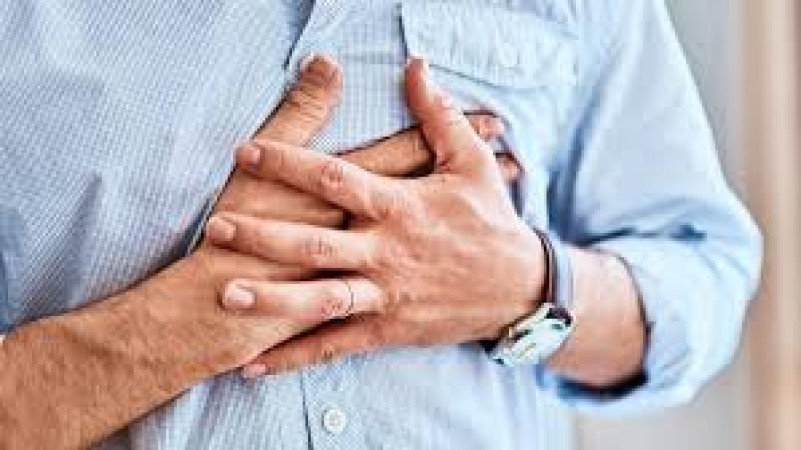
Sudden cardiac arrest (SCA) is a critical medical emergency where the heart suddenly stops pumping blood. This abrupt cessation leads to an immediate loss of consciousness and, if not treated promptly, can result in death within minutes. Recently, the tragic death of social media influencer Insha Ghai's husband, Ankit Kalra, at the young age of 29 due to sudden cardiac arrest has highlighted the urgency of understanding this condition. Despite having no known heart problems, Ankit's untimely demise has brought the issue into the spotlight. Here’s an in-depth look at what sudden cardiac arrest is, its causes, and ways to mitigate risks.
What is Sudden Cardiac Arrest?
Sudden cardiac arrest is a condition where the heart unexpectedly stops beating effectively. This interruption in heart function prevents blood from being pumped to vital organs, including the brain. Consequently, the individual loses consciousness almost immediately and ceases to have a detectable heartbeat. If not treated within minutes, sudden cardiac arrest can lead to death. It is crucial to differentiate sudden cardiac arrest from a heart attack, as they are distinct medical emergencies. While a heart attack involves a blockage in blood flow to the heart muscle, sudden cardiac arrest is related to electrical disturbances in the heart.
Causes of Sudden Cardiac Arrest
Understanding the causes behind sudden cardiac arrest is essential for prevention and early intervention. Here are some of the key factors:
Unhealthy Lifestyle: A significant contributor to sudden cardiac arrest is an unhealthy lifestyle, which encompasses poor dietary habits, lack of physical activity, and excessive consumption of unhealthy substances.
Poor Diet: Diets high in saturated fats, trans fats, and sugars can lead to the development of cardiovascular diseases, increasing the risk of sudden cardiac arrest.
Lack of Exercise: Sedentary lifestyles contribute to obesity and heart disease, which are risk factors for sudden cardiac arrest.
Substance Abuse: Excessive alcohol consumption and the use of recreational drugs can have detrimental effects on heart health.
Excessive Stress: Modern life often involves high levels of stress from work, family, and personal pressures. Chronic stress has a profound impact on heart health.
Hormonal Imbalance: Stress triggers the release of stress hormones like cortisol, which can affect heart rhythm and contribute to conditions that might lead to sudden cardiac arrest.
Increased Blood Pressure: Persistent stress can elevate blood pressure, strain the heart, and increase the risk of heart-related issues.
Smoking: Tobacco use is a major risk factor for cardiovascular diseases. Smoking accelerates the development of atherosclerosis (hardening of the arteries), which can lead to sudden cardiac arrest.
Arterial Damage: Chemicals in tobacco damage the lining of blood vessels, making them more prone to blockages.
Heart Strain: Nicotine increases heart rate and blood pressure, putting additional stress on the heart.
Genetic Factors: In some cases, genetic predispositions can play a role in sudden cardiac arrest. Certain inherited conditions can affect heart rhythm and increase the risk of SCA.
Underlying Health Conditions: Pre-existing medical conditions such as cardiomyopathy (disease of the heart muscle), congenital heart defects, or arrhythmias (irregular heartbeats) can predispose individuals to sudden cardiac arrest.
Recognizing the Signs
Sudden cardiac arrest often occurs without warning. Unlike a heart attack, which may present with symptoms such as chest pain or discomfort, sudden cardiac arrest happens abruptly. This lack of prior symptoms makes it challenging to predict or prevent. Recognizing the risk factors and leading a healthy lifestyle can help mitigate the chances of sudden cardiac arrest.
Preventive Measures
To reduce the risk of sudden cardiac arrest, consider the following preventive measures:
Adopt a Healthy Lifestyle: Incorporate a balanced diet rich in fruits, vegetables, whole grains, and lean proteins. Engage in regular physical activity and avoid smoking and excessive alcohol consumption.
Manage Stress: Practice stress management techniques such as mindfulness, meditation, and physical relaxation exercises. Seek professional help if needed to address chronic stress.
Regular Health Check-ups: Regularly monitor heart health and address any underlying conditions with your healthcare provider.
Stay Informed: Educate yourself about heart health and sudden cardiac arrest. Awareness can be key to prevention and timely intervention.
Sudden cardiac arrest is a sudden and severe condition that can lead to rapid death if not treated immediately. Understanding the underlying causes, including lifestyle factors, stress, and genetic predispositions, is crucial in managing and reducing the risk. By adopting healthy habits, managing stress, and staying vigilant about heart health, individuals can take proactive steps to protect themselves from this life-threatening condition.
What Foods to Feed Your Baby After 6 Months: Expert Opinions
New Study Finds Potential Link Between Weight Loss Drug and Mental Health Issues
National Banana Lovers Day Nears: Discover the Health Benefits of Bananas!